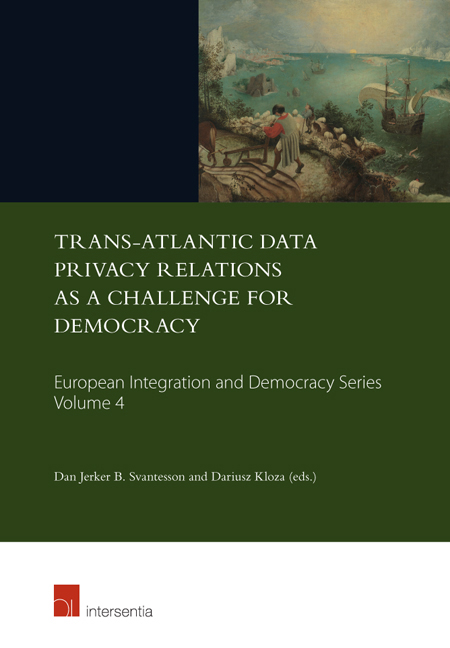Book contents
- Frontmatter
- Foreword
- Preface
- Contents
- List of Abbreviations
- PART I PRIVACY AND …
- SECTION I PRIVACY AND TRANSBORDER FLOWS OF PERSONAL DATA
- INVITED COMMENTS
- SECTION II PRIVACY AND INTERNATIONAL TRADE
- INVITED COMMENT
- SECTION III PRIVACY AND TERRITORIAL APPLICATION OF THE LAW
- SECTION IV PRIVACY AND CRIME
- INVITED COMMENTS
- 13 Terrorism and Paedophilia on the Internet: A Global and Balanced Cyber-Rights Response Is Required to Combat Cybercrime, Not Knee-Jerk Regulation
- 14 Understanding the Perpetuation of ‘Failure’ : The 15th Anniversary of the US Terrorist Finance Tracking Programme
- SECTION V PRIVACY AND TIME INVITED COMMENTS
- PART II THEORY OF PRIVACY
- PART III ALTERNATIVE APPROACHES TO THE PROTECTION OF PRIVACY
- INVITED COMMENT
- CONCLUSION
13 - Terrorism and Paedophilia on the Internet: A Global and Balanced Cyber-Rights Response Is Required to Combat Cybercrime, Not Knee-Jerk Regulation
from INVITED COMMENTS
Published online by Cambridge University Press: 29 September 2018
- Frontmatter
- Foreword
- Preface
- Contents
- List of Abbreviations
- PART I PRIVACY AND …
- SECTION I PRIVACY AND TRANSBORDER FLOWS OF PERSONAL DATA
- INVITED COMMENTS
- SECTION II PRIVACY AND INTERNATIONAL TRADE
- INVITED COMMENT
- SECTION III PRIVACY AND TERRITORIAL APPLICATION OF THE LAW
- SECTION IV PRIVACY AND CRIME
- INVITED COMMENTS
- 13 Terrorism and Paedophilia on the Internet: A Global and Balanced Cyber-Rights Response Is Required to Combat Cybercrime, Not Knee-Jerk Regulation
- 14 Understanding the Perpetuation of ‘Failure’ : The 15th Anniversary of the US Terrorist Finance Tracking Programme
- SECTION V PRIVACY AND TIME INVITED COMMENTS
- PART II THEORY OF PRIVACY
- PART III ALTERNATIVE APPROACHES TO THE PROTECTION OF PRIVACY
- INVITED COMMENT
- CONCLUSION
Summary
INTRODUCTION
[A]s the Internet erases the distance between countries, we see growing efforts by terrorists to poison the minds of people like the Boston Marathon bombers and the
San Bernardino killersA recent budget bill in the United States, which used an unconventional procedural measure to bring a controversial cyber-surveillance bill to the floor, contained the word ‘cyber’ 423 times It was observed that the word ‘increasingly connotes a malware arms race that nobody wins’ This chapter takes a critical look at international instruments, some selected legislation and case law to better understand how cyber law is dealt with globally against a background of concerns over balancing freedom with regulation of the Internet It discusses the use of terrorism and paedophilia as excuses for regulation of the Internet and considers whether human rights standards are being safeguarded as individual states legislate to regulate use of the Internet Taking a particular focus on an international legal analysis in the context of freedom of expression, freedom of information, surveillance and right to privacy issues, this chapter is approached from the following perspectives: the regulation of criminal activity online, consideration of data privacy relations, jurisdictional issues in the context of cyber evidence, balancing regulation with the freedom of expression (both generally and in relation to political dissent) and balancing the protection of the privacy of victims in the wider context of transnational organised crime It is necessarily an overview of such huge topics and is therefore set against the background of three areas of criminal law:
the release of the draft cybercrime law for Cambodia in 2014;
using technology to combat human trafficking;
extra-territorial jurisdiction.
These areas involving investigation, jurisdiction and legislation in the context of cyber law and technology are discussed in the context of the human rights framework However, the chapter seeks to also explore the Internet as a tool for liberation where there are dangers in the context of terrorist and online sexual grooming and abuse.
- Type
- Chapter
- Information
- Publisher: IntersentiaPrint publication year: 2017

